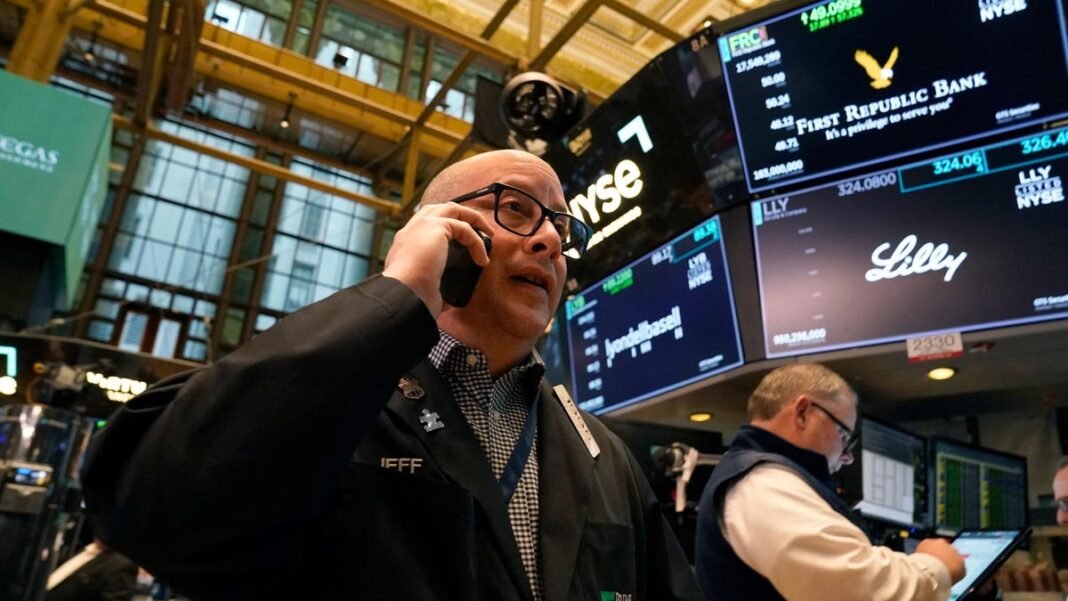Topline
U.S. stocks plunged in Wednesday trading as concerns about the health of the global banking industry continued to weigh on the market, with one high-profile Wall Street bigwig cautioning the contagion of Silicon Valley Bank’s failure could spread further than previously anticipated.
Call your loved ones: Stock indexes are on pace for one of their worst days of 2023.
Key Facts
The Dow Jones Industrial Average fell as much as 726 points, or 2.3%, before recovering to a 280-point dip on the day; the S&P 500 and tech-heavy Nasdaq similarly slid as much as 2% apiece before rebounding to 0.7% decline and a 0.1% gain, respectively.
The initial domestic losses came after broad drops in stocks abroad, with the Zurich-based bank Credit Suisse’s 23% slide to a record low in share prices amid capital concerns headlining the losses.
Much of the market recovery came after Swiss regulators committed to providing liquidity to Credit Suisse if necessary while noting there are no “indications of a direct risk of contagion” for the embattled bank, which meets the country’s liquidity and capital minimums.
Also stoking concerns about the fallout of Silicon Valley Bank, Signature Bank and Silvergate Capital’s recent closures was a bleak letter from Blackrock CEO Larry Fink warning the failures could simply be the first “domino[es] to drop” before a potential “cascade throughout the U.S. regional banking sector with more seizures and shutdowns coming.”
Regional bank stocks captained Wednesday’s sinking ship, with share prices of PacWest sinking 13% and First Republic dropping 21%.
Fink noted inflation could persist at close to 4% for the next couple years as the Federal Reverse refocuses its attention on keeping the banking industry afloat instead of bringing down consumer prices.
Big Number
$39 billion. That’s roughly how much market value the 10 largest U.S. bank stocks lost Wednesday. The grouping tacked on $5 billion in market capitalization in the final 10 minutes of trading.
Key Background
The Dow surged as much as 1.5% Tuesday as investors largely shook off their deepest concerns about how widespread the effects of the bank collapses would spread, even as some analysts warned to remain skeptical of the rally. Stocks had previously crashed in the prior three trading sessions, with the 10 largest U.S. banks shedding $187 billion in market capitalization during the timeframe. The rating agency Moody’s downgraded its view of the U.S. banking sector from stable to negative Wednesday, citing “the rapid and substantial decline in bank depositor and investor confidence…exacerbated by rapidly rising interest rates.” The federal funds rate, which determines overnight lending costs between banks and is set by the Fed, is at a 16-year high, making banks’ cost of doing business its most expensive since before the Great Recession.
Surprising Fact
Wholesale prices declined 0.1% last month, according to Labor Department data released Wednesday, surprising against economist estimates of a 0.3% increase. The bullish inflation reading, which comes a day after the consumer price index hit an 18-month low, did little to move markets as investors paid far greater attention to the banking situation.
Further Reading
Credit Suisse Stock Plunges To Record Low As Bank Concerns Grow (Forbes)
Inflation Fell To 6% In February—But Some Experts Fear Banking Crisis Could Make Prices Worse (Forbes)
‘Head Fake Rally’? Dow Jumps 400 Points On Bank Stocks’ $37 Billion Recovery (Forbes)



